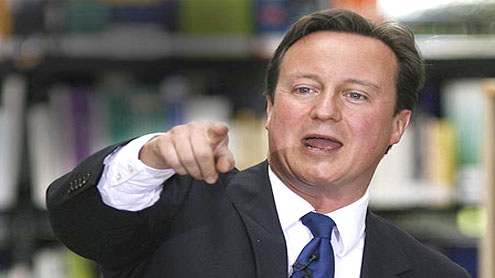 British Prime Minister David Cameron, in his first, and whirlwind, visit since assuming office, has called for a new start in relations with Pakistan. And well he might. On a visit to India in June 2009, Mr Cameron ruffled quite a few feathers in both the civilian and security establishment by stating that Pakistan could not be allowed to “look both ways” on terrorism, i.e. exporting terror while ostensibly being part of the international coalition fighting terror.
British Prime Minister David Cameron, in his first, and whirlwind, visit since assuming office, has called for a new start in relations with Pakistan. And well he might. On a visit to India in June 2009, Mr Cameron ruffled quite a few feathers in both the civilian and security establishment by stating that Pakistan could not be allowed to “look both ways” on terrorism, i.e. exporting terror while ostensibly being part of the international coalition fighting terror.
There may have been a grain of truth in the British prime minister’s assertion. But the fact that he stated it while standing on Indian soil is what riled official tempers here. Tempered no doubt by the realities of being in office, Mr Cameron has by now realised the importance if not central role of Pakistan in the struggle against terrorism and the situation in Afghanistan on the eve of the US/NATO withdrawal. The interactions of the British prime minister with our premier and president therefore attempted a diplomatic papering over of the earlier gaffe. Enhanced cooperation in security matters and consultation on global and regional issues has been promised. While all this sounds good, the problem is the ‘elephant in the room’ was studiously ignored by both sides: the continuing support of our security establishment for the Afghan Taliban. To that extent, the ‘papering over’ may have helped soothe ruffled feathers here, but the prospects for a satisfactory outcome in Afghanistan before the western withdrawal remains a moot point.
The sweetener, amongst others, thrown in by Mr Cameron was improved cooperation on counter-terrorism and Afghanistan, with a recognition of Pakistan’s sacrifices thrown in for good measure. The strategic dialogue too is to be upgraded. Trade will be enhanced to Pounds 2.5 billion by 2015, double the present 1.2 billion. Britain will also advocate Pakistan’s case for access to the EU market. British investment in Pakistan will be sought. Pounds 650 million will be on offer to put four million Pakistani children in school, upgrade the entire educational system, help in IT and communications, and ensure an increase in scholarships and visas.Ironically, while arguing that Britain no longer believes in the “old fashioned thinking” of taking sides in the Subcontinent, Mr Cameron was at pains to stress the “unbreakable” relationship with Pakistan, at the same time welcoming the recent Mohali ‘thaw’ between Pakistan and India.
On the potentially vexed question of Musharraf’s return to Pakistan, the British prime minister argued that Pakistan and Britain did not have an extradition treaty. Any application for handing him over therefore would have to be properly moved. Interestingly, this contradicts the statements of the FIA in court when they stated that such an application has been moved but turned down by the British authorities. Who to believe? In any case, this is not a very promising tree to be barking up because Britain has a long standing policy of reluctance to deport back to their country of origin leaders no longer in power (including dictators) seeking a safe haven on British soil. Our very own Altaf Hussain has not only successfully lived on British soil for many years, he has by now even acquired British nationality. Musharraf may not have this advantage, but nine chances out of ten he can rely on the long standing British policy of offering safe havens to ex-rulers, no matter how serious the matters that require their presence to answer charges in their homeland. – Dailytimes












